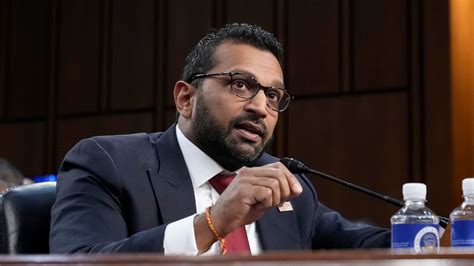
Kash Patel, a former federal prosecutor and Trump administration official, revealed on “The Joe Rogan Experience” podcast that he was the victim of a “swatting” incident, confirming widespread speculation. Patel described the harrowing experience, detailing the heavy police presence that descended upon his home.
Kash Patel, a former federal prosecutor and a figure prominent in the Trump administration, publicly confirmed he was “swatted” during an appearance on “The Joe Rogan Experience” podcast. The incident, which involves a false report to law enforcement designed to provoke an armed response at a person’s home, adds Patel’s name to a growing list of public figures who have experienced this dangerous harassment tactic.
Patel recounted the events of the day, describing how a large contingent of law enforcement officers, responding to a fabricated emergency, arrived at his residence. The specific details he provided shed light on the potential severity and emotional toll of being targeted in such a manner. While details of the incident had circulated previously, this was the first time Patel publicly acknowledged and discussed the event.
“I got swatted,” Patel told Rogan, confirming suspicions that had been circulating within conservative media circles. The confirmation brings the issue of swatting, and its potential dangers, back into the spotlight.
The “swatting” incident, a form of harassment involving a false report to trigger a large police response, underscores the dangers faced by public figures in the current political climate. Patel’s disclosure on Rogan’s widely listened-to podcast brings the issue to a broader audience, raising awareness about the potential consequences of such malicious acts.
Patel didn’t offer specific details about the timing or location of the incident but emphasized the seriousness of the situation. He did not speculate on the motive behind the swatting or who might be responsible. The acknowledgement comes amidst a charged political atmosphere, where public figures, particularly those associated with controversial policies or administrations, are often targets of harassment and intimidation.
The incident highlights the increasing prevalence of swatting, a tactic that exploits law enforcement resources and endangers both the victims and the responding officers. Law enforcement agencies have been working to combat swatting by improving their response protocols and increasing public awareness of the crime. Patel’s experience serves as a stark reminder of the potential consequences of this dangerous form of harassment.
Patel, who served as a top aide to former Congressman Devin Nunes and later held positions in the Trump administration, including roles at the National Security Council and the Department of Defense, has been a controversial figure. His involvement in investigations related to alleged Russian interference in the 2016 election and his staunch defense of President Trump have made him a target of criticism and scrutiny. The swatting incident adds another layer to his already complex public profile.
The confirmation of the swatting incident is likely to fuel further debate about the safety and security of public figures and the need for stronger measures to deter and punish those who engage in this type of harassment. The issue of swatting has gained increasing attention in recent years, with several high-profile cases involving celebrities, politicians, and journalists. Law enforcement agencies are grappling with the challenge of responding effectively to these incidents while minimizing the risk to both the victims and the officers involved.
The revelation on Joe Rogan’s podcast, known for its wide reach and often controversial discussions, ensures that Patel’s experience will receive significant attention. It serves as a powerful example of the potential dangers faced by individuals who are in the public eye, particularly those involved in politically sensitive matters.
The swatting incident targeting Kash Patel raises several important questions about the safety and security of public figures in the current political climate. It underscores the need for greater awareness of the dangers of swatting and for stronger measures to deter and punish those who engage in this type of harassment. The incident also highlights the importance of law enforcement agencies having effective protocols in place to respond to these types of situations while minimizing the risk to both the victims and the officers involved.
Beyond the immediate impact on Patel, the incident shines a light on the broader issue of political polarization and the increasing tendency to resort to extreme tactics to intimidate or silence those with opposing viewpoints. It serves as a reminder of the importance of respectful dialogue and the need to reject violence and harassment in all forms.
The confirmation of the swatting incident during the Joe Rogan podcast has amplified the discussion surrounding the safety of public figures and the escalating risks they face in an increasingly polarized environment. Patel’s experience serves as a case study highlighting the potential dangers associated with holding controversial positions or expressing dissenting opinions.
While Patel did not elaborate on the ongoing investigation, the acknowledgement of the incident is anticipated to further fuel discussions about online harassment, the weaponization of law enforcement, and the measures required to protect individuals from such malicious acts. The focus now shifts to potential law enforcement actions and the broader implications for safeguarding public figures against swatting incidents.
The Joe Rogan Experience’s considerable audience ensures that Patel’s revelation will resonate widely, potentially prompting increased awareness and inspiring further action to combat swatting incidents. The conversation is expected to extend beyond political circles, engaging a wider public in discussions about personal safety, online responsibility, and the ethical boundaries of political discourse.
Expanding on Key Aspects
The Prevalence of Swatting: Swatting, a portmanteau of “SWAT” and “hitting,” has become an increasingly common form of harassment, particularly targeting individuals with a significant online presence or those involved in controversial public debates. The motivation behind swatting varies, ranging from personal vendettas to attempts to silence dissenting voices or disrupt public figures.
The act involves making a false report to law enforcement, often claiming a serious crime such as a hostage situation, active shooter, or bomb threat is occurring at the victim’s address. The goal is to trigger a large-scale response from law enforcement, including SWAT teams, creating a chaotic and potentially dangerous situation for the victim and their family.
The consequences of swatting can be severe. Victims may face physical harm from overly aggressive law enforcement responses, emotional distress, and financial losses due to property damage or legal fees. Law enforcement resources are also strained, diverting them from legitimate emergencies.
The rise of swatting has been fueled by the anonymity and ease of communication afforded by the internet. Online forums and social media platforms provide a space for individuals to coordinate and execute swatting attacks, often with little fear of being caught. The use of caller ID spoofing and other technological tools makes it difficult for law enforcement to trace the origin of the false reports.
The Political Context: Kash Patel’s background as a prominent figure in the Trump administration adds a layer of political significance to the swatting incident. Patel served in several key roles, including as a top aide to former Congressman Devin Nunes on the House Intelligence Committee, where he played a central role in investigations related to alleged Russian interference in the 2016 election. He later served as a senior official at the National Security Council and the Department of Defense under President Trump.
Patel’s involvement in these politically charged investigations and his staunch defense of President Trump have made him a target of criticism from Democrats and some members of the media. The swatting incident may be seen as a manifestation of the heightened political polarization in the United States, where individuals with differing political viewpoints are increasingly likely to engage in harassment and intimidation tactics.
The targeting of public figures with controversial political affiliations is not new, but the rise of swatting has added a new dimension to this phenomenon. Swatting allows individuals to directly target their political opponents in a way that can have serious and potentially life-threatening consequences.
Law Enforcement Response: Law enforcement agencies across the country are grappling with the challenge of responding to swatting incidents effectively. The key is to quickly assess the credibility of the report and determine whether it is a legitimate emergency or a hoax. This requires careful analysis of the information provided by the caller, as well as cross-referencing with other sources.
Many law enforcement agencies have implemented protocols to help them identify and respond to swatting incidents. These protocols may include:
- Enhanced Screening: Training dispatchers to identify potential swatting calls based on specific indicators, such as a lack of specific details or inconsistencies in the caller’s story.
- Geolocation Technology: Using geolocation technology to verify the location of the caller and the alleged incident.
- Cross-Referencing with Social Media: Monitoring social media for any signs of a potential swatting attack.
- Coordination with Other Agencies: Coordinating with other law enforcement agencies and emergency services to ensure a coordinated response.
Despite these efforts, it can be difficult to distinguish a legitimate emergency from a swatting attack, especially in the initial stages of the response. Law enforcement officers must balance the need to respond quickly to potential threats with the need to avoid unnecessarily endangering the victims of swatting incidents.
Legal and Ethical Considerations: Swatting is a serious crime that can result in significant penalties, including imprisonment. In many jurisdictions, swatting is charged as a felony, with the severity of the penalty depending on the circumstances of the case, such as whether anyone was injured or killed as a result of the incident.
In addition to criminal charges, individuals who engage in swatting may also be subject to civil lawsuits. Victims of swatting can sue the perpetrators for damages, including medical expenses, property damage, and emotional distress.
From an ethical standpoint, swatting is widely condemned as a dangerous and irresponsible act. It is a form of harassment that can have devastating consequences for the victims and their families. It also undermines public trust in law enforcement and wastes valuable resources.
The Role of Social Media and Online Platforms: Social media and online platforms have played a significant role in the rise of swatting. These platforms provide a space for individuals to coordinate and execute swatting attacks, often with little fear of being caught.
Some social media and online platforms have taken steps to combat swatting by banning users who engage in this type of activity and by cooperating with law enforcement investigations. However, more needs to be done to address the problem.
One potential solution is to require users to verify their identities before they are allowed to create accounts on social media and online platforms. This would make it more difficult for individuals to hide behind anonymous profiles and would make it easier for law enforcement to track down perpetrators of swatting attacks.
Another potential solution is to increase public awareness of the dangers of swatting and to encourage individuals to report any suspicious activity to law enforcement. This would help to deter potential swatters and would make it more likely that they will be caught and prosecuted.
The Impact on Public Discourse: The increasing prevalence of swatting and other forms of online harassment is having a chilling effect on public discourse. Individuals are becoming increasingly hesitant to express their opinions online for fear of being targeted by harassment or intimidation tactics.
This is particularly concerning in the context of political debate. If individuals are afraid to express their political views online, it can stifle free speech and undermine the democratic process.
It is important to create a safe and respectful online environment where individuals can express their opinions without fear of being harassed or intimidated. This requires a multi-faceted approach, including stronger laws, more effective enforcement, and greater public awareness.
Addressing the Issue of Swatting: Possible Solutions
Combating swatting requires a multi-faceted approach involving technological solutions, legal reforms, and increased public awareness. Some potential solutions include:
- Enhanced Verification Processes: Implementing stricter verification processes for emergency calls, including the use of geolocation technology and callback procedures to confirm the legitimacy of the report.
- Increased Penalties: Increasing the penalties for swatting to deter potential offenders and send a clear message that this type of behavior will not be tolerated.
- Civil Liability: Allowing victims of swatting to sue perpetrators for damages, including emotional distress, property damage, and legal fees.
- Public Awareness Campaigns: Launching public awareness campaigns to educate the public about the dangers of swatting and to encourage individuals to report any suspicious activity to law enforcement.
- Collaboration between Law Enforcement and Technology Companies: Fostering collaboration between law enforcement agencies and technology companies to develop new tools and techniques for preventing and responding to swatting incidents.
- Mental Health Support: Providing mental health support to victims of swatting to help them cope with the trauma of the experience.
The Joe Rogan Experience and Its Influence:
The Joe Rogan Experience (JRE) is one of the most popular podcasts in the world, boasting millions of listeners and a wide-ranging audience. Rogan’s interviews often delve into controversial topics and feature guests from diverse backgrounds, including scientists, athletes, politicians, and comedians.
The podcast’s reach and influence make it a powerful platform for disseminating information and shaping public opinion. Patel’s decision to discuss the swatting incident on JRE likely reflects an effort to raise awareness about the issue and to reach a broader audience than he might have through traditional media outlets.
However, the JRE has also been criticized for spreading misinformation and promoting controversial viewpoints. Some have questioned Rogan’s qualifications to discuss complex scientific and political issues and have accused him of platforming individuals with extremist views.
The decision to discuss the swatting incident on JRE raises questions about the responsibility of podcast hosts to ensure the accuracy and context of the information they present. While Rogan provides a platform for a variety of voices, he also has a responsibility to ensure that his guests are not spreading misinformation or promoting harmful ideologies.
Conclusion:
The swatting incident targeting Kash Patel underscores the dangers faced by public figures in the current political climate. It highlights the need for greater awareness of the risks of online harassment and the importance of taking steps to protect individuals from these types of attacks.
The incident also raises broader questions about the state of political discourse in the United States and the increasing tendency to resort to extreme tactics to intimidate or silence those with opposing viewpoints. It is important to create a more civil and respectful political environment where individuals can express their opinions without fear of being harassed or intimidated.
The confirmation of the swatting incident during the Joe Rogan podcast has amplified the discussion surrounding these issues and has brought them to the attention of a wider audience. It is hoped that this will lead to increased awareness and action to combat swatting and other forms of online harassment.
Frequently Asked Questions (FAQ)
1. What is swatting?
Swatting is a form of harassment that involves making a false report to law enforcement, typically claiming a serious crime such as a hostage situation, active shooter, or bomb threat is occurring at a specific location. The goal is to provoke a large-scale response from law enforcement, including SWAT teams, at the victim’s address.
2. Why did Kash Patel reveal this information on the Joe Rogan podcast?
The Joe Rogan Experience podcast has a massive audience and is known for discussing a wide range of topics, often in a candid and unfiltered manner. Patel likely chose this platform to bring awareness to the incident and the dangers of swatting to a broad audience.
3. What are the potential legal consequences for someone who engages in swatting?
Swatting is a serious crime that can result in significant penalties, including imprisonment. In many jurisdictions, it is charged as a felony. Perpetrators may also face civil lawsuits from the victims for damages such as emotional distress, property damage, and legal fees.
4. What can law enforcement do to prevent or mitigate swatting incidents?
Law enforcement agencies are implementing various measures, including enhanced screening of emergency calls, using geolocation technology to verify the location of the caller, cross-referencing information with social media, and coordinating with other agencies. Training dispatchers to identify potential swatting calls is also crucial.
5. What is the broader impact of swatting on society and public discourse?
Swatting has a chilling effect on public discourse, as individuals may become hesitant to express their opinions online for fear of being targeted. It also wastes law enforcement resources and can lead to physical harm and emotional distress for the victims. It contributes to a climate of fear and intimidation, undermining free speech and the democratic process.
Additional Contextual Information:
Kash Patel’s Career and Background:
Kashyap “Kash” Patel is an American attorney, former federal prosecutor, and former government official. He rose to prominence during his time working for Congressman Devin Nunes and later served in various roles within the Trump administration.
- House Intelligence Committee: Patel served as a senior staffer on the House Permanent Select Committee on Intelligence (HPSCI) under Chairman Devin Nunes. In this role, he played a key role in the committee’s investigation into alleged Russian interference in the 2016 United States presidential election. He was involved in drafting a controversial memo that accused the FBI and Department of Justice of abusing their surveillance powers during the investigation.
- National Security Council: During the Trump administration, Patel served as a senior director at the National Security Council (NSC). His responsibilities included advising the president on counterterrorism and national security matters.
- Department of Defense: Patel later served as chief of staff to the Acting United States Secretary of Defense during the final months of the Trump administration.
Patel’s involvement in these high-profile positions and investigations made him a controversial figure. He has been praised by some for his dedication to uncovering alleged wrongdoing, while others have criticized him for his role in promoting conspiracy theories and undermining the intelligence community.
The Joe Rogan Experience:
The Joe Rogan Experience (JRE) is a podcast hosted by comedian, actor, and UFC commentator Joe Rogan. Launched in 2009, it has become one of the most popular podcasts in the world, with millions of listeners tuning in to hear Rogan’s conversations with a wide range of guests.
- Format and Content: The JRE typically features long-form interviews, often lasting several hours. Rogan engages in free-flowing conversations with his guests, covering a wide range of topics, including science, technology, politics, current events, and comedy.
- Influence and Controversy: The JRE has a significant influence on public opinion, and Rogan’s views are often widely disseminated through social media and news outlets. However, the podcast has also been the subject of controversy. Rogan has been accused of spreading misinformation, particularly related to the COVID-19 pandemic, and of platforming individuals with extremist views.
- Platform for Uncensored Discussion: Despite the controversies, the JRE is valued by many for providing a platform for uncensored discussion. Rogan often invites guests with controversial viewpoints and allows them to express their opinions without interruption.
The inclusion of Kash Patel’s account of the swatting incident on the JRE highlights the podcast’s role as a platform for discussing important issues and reaching a broad audience. However, it also underscores the need for listeners to critically evaluate the information presented and to seek out diverse perspectives.









